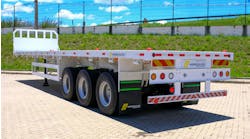NTDA Convention: Economy leads the list given by former ATA chairman based on survey of truckers
Tommy Hodges, chairman of Titan Transfer Inc and past chairman of the American Trucking Associations, gave a keynote speech in which he offered a list of the top 10 issues faced by the trucking industry, as chosen in a survey of truckers by the American Transportation Research Institute:
• Economy! Economy! Economy!
“The consumer is the key. Seventy percent of our economy is driven by consumer spending. As fuel creeps up and I’m uncertain about where it’s going, what happens to my behavior? ‘I’d better not order those 25 trailers I need.”
• Hours of Service rules.
He said that with the new rule effective next year, there will be big productivity losses highlighted by two 34-hour restarts.
“We have 3.6 million drivers across the country, and every one that gets in after midnight Friday has to spend Saturday and Sunday at home to be released to go to work at 6 am on Monday. Now think what that’s going to do to congestion when every one of those trucks is released to get to a destination at the same time. It’s a huge quagmire.
“ATA has sued. Stay tuned. All is subject to change. It’s in the circuit in Washington, and we just don’t know. I think we have a pretty good stance so that the same rule in effect now will stay in place.”
• Driver shortage.
He said that a tonnage growth of 31% by 2020 and population growth to 310 million combined with an exodus of drivers during the recession creates a critical situation.
“I grew up in a generation where a job was your asset. It was a thing you treasured. You may not have liked doing the physical work or the people around you, but your job was an asset. It’s changed. The commercial driver is a free agent.
“We are a consumer society. We want the goods when we want them. So all that ties to a tonnage growth of 31% by 2020 that will create a real paradox for us going forward, because there will be areas of the country that are underserved. We in the South can barely find drivers that will drive in the congestion of the Northeast. They’ll quit and make a business owner decide, ‘Am I better to keep that driver and let that load sit there than I am to lose this driver?’ ”
• CSA 2010.
He said it will change the way we do business, because all moving and equipment violations will count against the trucking company, and will stay with the company for 24 months.
“Some carriers considered ‘satisfactory’ are now showing not be in good shape. CSA is costing drivers a tremendous amount of difficulties. FMCSA at the beginning said they would adapt and make things better as we go. It just hasn’t happened.”
• Fuel issues.
“We compete with the world for fuel. The US is now a net exporter of refined petroleum products. Hybrids do not currently work in over-the-road applications. Fuel is the #1 cost for most truckload companies: approximately 59 cents per mile to operate an over-the-road truck without taxes.
• Congestion.
“There is a huge price tag in costs and time. One of the saddest commentaries we are leaving our children and that we’ve accepted in our lifetime is that it will take an hour to get to work and an hour to get home—that sitting in congestion is an acceptable waste of time.”
• Transportation funding.
“ATA’s approach to reauthorization is that we must have a credible seat at the table.”
• Tort reform.
“ATA has worked hard to make a significant difference. There’s anti-indemnification in 42 states. It’s simply the concept that a shipper can give you a contract that says if anything happens to that load, it’s all your fault. There are limits on punitive damages and primary seatbelt laws. We’ve worked hard on that.”
• On-board truck technology.
“Electronic logging devices are included in the Highway bill just signed. It levels the playing field for all carriers, with mandated installation and the law calling for one-year rule-making and a probable two-year implementation.
• Truck size and weight regulations.
“ATA’s position is to give states more flexibility to determine appropriate limits in the upcoming Highway Reauthorization. There’s a pilot program in Maine/Vermont, but it’s difficult to get a consensus on this issue. We were close to getting something done in the Highway Bill, but lost the provision.”








